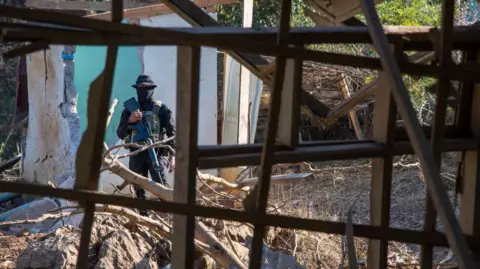Noorul Amin last spoke to his brother on 9 May. The call was brief, but the news was devastating.
He learned that his brother, Kairul, and four other relatives were among 40 Rohingya refugees allegedly deported by the Indian government to Myanmar, a country they had fled in fear years ago.
Myanmar is in the midst of a brutal civil war between the junta - which seized power in a 2021 coup - and ethnic militias and resistance forces.
The odds that Mr Amin will ever see his family again are vanishingly small.
I could not process the torment that my parents and the others who were taken are facing, Mr Amin, 24, told the BBC in Delhi.
Three months after they were removed from India's capital, the BBC managed to contact the refugees in Myanmar. Most are staying with the Ba Htoo Army (BHA), a resistance group fighting the military in the south-west of the country.
We don't feel secure in Myanmar. This place is a complete war zone, said Soyed Noor on a video call made from the phone of a BHA member. He spoke from a wooden shelter with six other refugees around him.
The BBC gathered testimonies from the refugees and accounts from relatives in Delhi and spoke to experts investigating the allegations to piece together what happened to them.
We have learnt that they were flown from Delhi to an island in the Bay of Bengal, put on a naval vessel and eventually forced into the Andaman Sea with life jackets. They then made their way to shore and are now facing an uncertain future in Myanmar, which the mostly-Muslim Rohingya community had fled in huge numbers in recent years to escape persecution.
They bound our hands, covered our faces and brought us like captives [on to the boat]. Then they threw us in the sea, John, one of the men in the group, told his brother by phone soon after reaching land.
How can someone just throw human beings into the sea? asked Mr Amin. There is humanity alive in the world but I have not seen any humanity in the Indian government.
Thomas Andrews, the UN's special rapporteur on the situation of human rights in Myanmar, says there is significant evidence proving these allegations, which he has presented to India's head of mission in Geneva but has yet to receive a response.
The BBC has also contacted India's Ministry of External Affairs several times but had not heard back by time of publication.
Campaigners have often flagged that the condition of Rohingya in India is precarious. India does not recognise the Rohingya as refugees but rather, as illegal immigrants under the country's Foreigners Act.
India has a sizeable population of Rohingya refugees, although Bangladesh, where more than a million live, has the biggest number. Most fled Myanmar after a deadly army crackdown in 2017. Despite having lived there for generations, Rohingya are not recognised in Myanmar as citizens.
There are 23,800 Rohingya refugees in India registered with the UNHCR, the UN's refugee agency. But Human Rights Watch estimates that the actual number is upwards of 40,000.
On 6 May the 40 Rohingya refugees, who had UNHCR refugee cards and lived in different parts of Delhi, were taken to their local police stations under the guise of collecting biometric data. This is a yearly process mandated by the Indian government where Rohingya refugees are photographed and fingerprinted. After several hours they were taken to the Inderlok Detention Centre in the city, they told the BBC.
Mr Amin says his brother called him then and told him he was being taken to Myanmar, and asked him to get a lawyer and alert the UNHCR.
On 7 May, the refugees said they were taken to Hindon airport, just east of Delhi, where they boarded planes to the Andaman and Nicobar Islands, an Indian territory in the Bay of Bengal.
After getting off the plane, we saw that two buses had come to receive us, said Mr Noor on the video call. He added he could see the words Bhartiya Nausena written on the side of the buses, the Hindi term referring to the Indian Navy.
Considering that tens of thousands of Rohingya refugees are living in India, it's not clear why so much effort was devoted to deporting these 40 people.
Nobody in India can understand why they did it, apart from this venom against Muslims, said Mr Gonsalves.
The treatment of the refugees has sent a chill throughout the Rohingya community in India. In the past year, its members claim there has been an increase in deportations by the Indian authorities. There are no official figures to confirm this.
Some have gone into hiding. Others like Mr Amin no longer sleep at home. He has sent his wife and three children elsewhere.
In my heart there is only this fear that the Indian government will take us also and throw us in the sea anytime. And now we are scared to even step out of our homes, Mr Amin said.
These are people who are in India not because they want to be, said Mr Andrews from the UN. They're there because of the horrific violence that is occurring in Myanmar. They literally have been running for their lives.


















